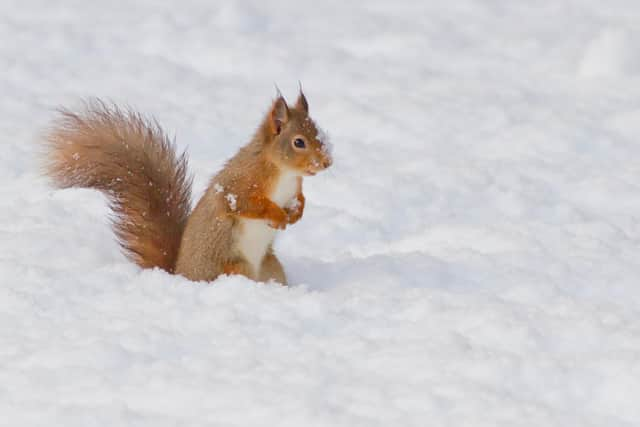Funding boost for work to save Scotland's iconic red squirrels from extinction
The Saving Scotland’s Red Squirrels (SSRS) project, led by the Scottish Wildlife Trust, has secured an initial £1.08 million support package for a two-year phase of transitional work starting in April 2022.
The cash comes from the project partners, which include NatureScot, Scottish Forestry, Scottish Land & Estates, RSPB Scotland and the Red Squirrel Survival Trust.
Advertisement
Hide AdAdvertisement
Hide AdFurther fund-raising is planned to increase this in the new year.


This new ‘booster’ phase will enable the project to complete its aims and plan for the long-term future, leaving a legacy of sustainable and community-led red squirrel conservation across the south of Scotland.
Red squirrels are native to the UK and were once commonplace, but populations have crashed dramatically in modern times.
Estimates suggest there are only around 160,000 or so left across the nation, with around three quarters of these found in Scotland.
The declines are blamed primarily on the introduction of non-native grey squirrels to the UK in the 18th and 19th centuries.
The larger North American species can out-compete native squirrels for food and living space, while also passing on squirrelpox – a virus that doesn’t harm greys, but can be deadly to reds.
But loss of suitable habitat due to changes in land use, including destruction of woodlands, has also contributed to declines.
Vital conservation work will continue in all the project’s priority areas to help mitigate some of the difficulties the initiative has faced in recent years.
Advertisement
Hide AdAdvertisement
Hide AdMeasures aimed at boosting populations include controlling numbers of non-native grey squirrels in certain parts of the country where they have not yet taken over as the dominant species.
One of the project’s key aims is to build a network of local volunteers in priority areas across the south of Scotland, where healthy red squirrel populations are surrounded by greys and squirrelpox is a major threat.
The aim is to upskill these volunteers to enable them to continue red squirrel conservation work after the project comes to an end.
Project manager Dr Mel Tonkin said: “Thanks to the hard work of our staff, volunteers, landowners and partners we’ve seen some fantastic success stories in the past five years.
“But the project has also faced challenges, particularly due to the impact of Covid-19.
“During lockdown much of our grey squirrel control and survey work was suspended.
“This additional two years will help us further secure the red squirrel’s place amongst Scotland’s special native wildlife.”
Scottish Wildlife Trust chief executive Jo Pike said: “We’re delighted to have secured funding to enable the two-year transition phase to take place.
Advertisement
Hide AdAdvertisement
Hide Ad“The strength of the collaboration between partners, the quality of the data and evidence-gathering and the extraordinary contribution from volunteers have all combined to make this a project that is rightly viewed as an exemplar of invasive non-native species control.
“We very much look forward to continuing the important work to secure the future of red squirrels in Scotland.”
SSRS was awarded £2.46m from the National Lottery Heritage Fund in 2017.
The new phase of work will run until March 2024.
A message from the Editor:
Thank you for reading this article. We’re more reliant on your support than ever as the shift in consumer habits brought about by coronavirus impacts our advertisers.
If you haven’t already, please consider supporting our trusted, fact-checked journalism by taking out a digital subscription.
Comments
Want to join the conversation? Please or to comment on this article.
